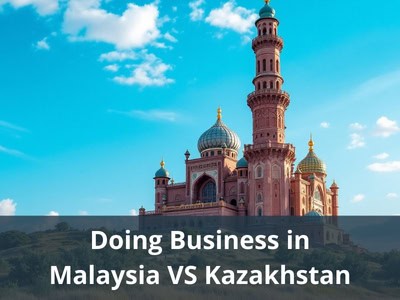Doing Business in Malaysia VS Kazakhstan – A Comparison
 Investors looking to expand into Asia may find themselves choosing between Malaysia and Kazakhstan. While Malaysia is part of the ASEAN network with a strong digital infrastructure and pro-business policies, Kazakhstan serves as a strategic gateway between Europe and Asia with abundant natural resources and incentives in its special economic zones.
Investors looking to expand into Asia may find themselves choosing between Malaysia and Kazakhstan. While Malaysia is part of the ASEAN network with a strong digital infrastructure and pro-business policies, Kazakhstan serves as a strategic gateway between Europe and Asia with abundant natural resources and incentives in its special economic zones.
This comparison helps you evaluate both countries based on incorporation ease, tax policies, market access, and business operating costs—key factors for any international expansion.
Key Comparison Points
Business Environment
- Malaysia: Malaysia offers a stable business environment with investor-friendly government initiatives, strong digital infrastructure, and active participation in global trade agreements.
- Kazakhstan: Kazakhstan is a resource-rich country with improving regulatory frameworks, particularly in the Astana International Financial Centre (AIFC), though bureaucracy can still pose challenges.
Taxation
- Malaysia: Malaysia maintains a flat 24% corporate tax rate, with incentives for SMEs and no capital gains tax on most asset disposals.
- Kazakhstan: Kazakhstan applies a 20% corporate tax rate, and capital gains are generally taxed, although certain exemptions apply within special economic zones.
Ease of Company Incorporation
Cost of Living and Business Operations
- Malaysia: With affordable office space, labor, and services, Malaysia is ideal for starting a business in Malaysia and managing costs efficiently.
- Kazakhstan: Business costs are moderate, though certain services and imports may be more expensive due to regional logistics and economic fluctuations.
Access to Markets
- Malaysia: Malaysia enjoys trade access through ASEAN, RCEP, and CPTPP, connecting businesses to global markets in Asia-Pacific and beyond.
- Kazakhstan: Kazakhstan provides access to Eurasian Economic Union (EAEU) markets and shares transit routes between China and Europe, boosting logistics and manufacturing sectors.
Quick Comparison Overview
Here’s a quick overview of the key differences for easy reference.
| Factors |
Malaysia |
Kazakhstan |
| Business Environment |
Stable, digital-ready, investment-friendly |
Resource-rich, reforming regulations, regional hub |
| Corporate Tax Rate |
24% |
20% |
| Capital Gains Tax |
Generally not applicable |
Applicable, with some exemptions |
| Ease of Incorporation |
Digital, fast via company setup in Malaysia |
Simplified for locals; more complex for foreigners |
| Business Costs |
Low operating and living costs |
Moderate, with variable logistics costs |
| Market Access |
ASEAN, CPTPP, RCEP, global FTAs |
EAEU, China-Europe trade corridor |

Benefits of Choosing 3E Accounting
Selecting the right partner is crucial when it comes to starting a business in Malaysia. At 3E Accounting, we offer a comprehensive range of solutions designed to simplify the entire process of company incorporation in Malaysia. From ensuring compliance with local regulations to providing expert guidance tailored to your specific needs, we make the journey seamless.
For entrepreneurs looking to navigate Malaysia company registration or explore company setup in Malaysia, our team provides unmatched expertise and support. Additionally, our company incorporation services are tailored to help you succeed in the competitive business environment.
With a deep understanding of the region’s business landscape, we also provide resources for setting up businesses in Malaysia, ensuring that every step is clear and efficient. Whether you need assistance with corporate secretarial or company secretary services, we are here to help.
To explore our services or discuss your business needs, contact 3E Accounting. With our strong presence in Malaysia and a proven track record, we are your trusted partner for success in Asia.
Ready to Expand into Malaysia? Choose 3E Accounting Today!
Stay Secure, Stay Successful With 3E Accounting Services
Contact Us Now
Frequently Asked Questions
Kazakhstan has a slightly lower corporate tax rate at 20%, while Malaysia’s rate is 24%, but Malaysia offers more exemptions and no capital gains tax in most cases.
Malaysia is a member of ASEAN, CPTPP, and RCEP, providing wider trade opportunities than Kazakhstan, which primarily connects through the Eurasian Economic Union.
Yes, company setup in Malaysia is fully supported by expert firms like 3E Accounting, offering end-to-end assistance for local and foreign investors.
Abigail Yu oversees executive leadership at 3E Accounting Group, leading operations, IT solutions, public relations, and digital marketing to drive business success. She holds an honors degree in Communication and New Media from the National University of Singapore and is highly skilled in crisis management, financial communication, and corporate communications.



